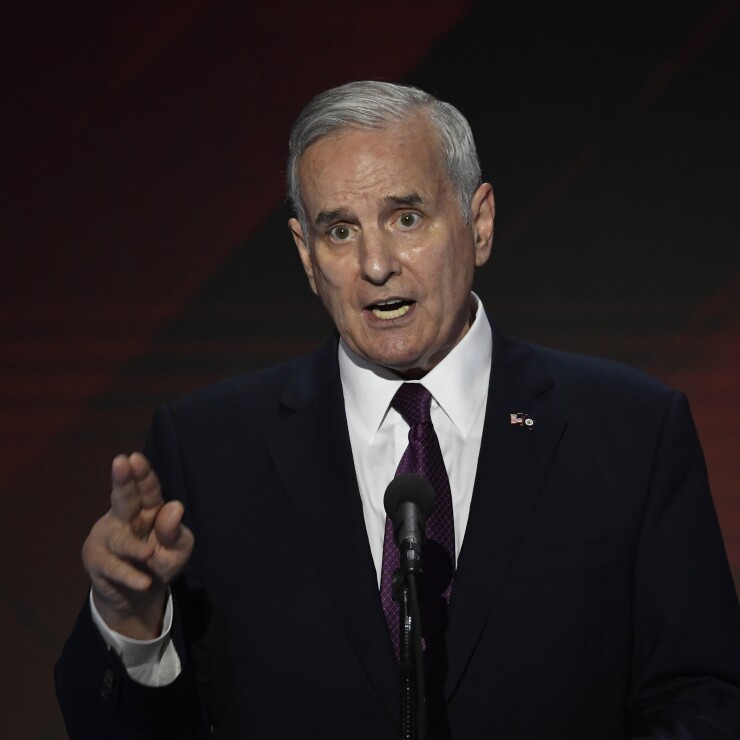CHICAGO – A budget feud between Minnesota Gov. Mark Dayton and the legislature’s GOP majority doesn’t pose an imminent threat to the state’s high-grade ratings, said Fitch Ratings and Moody’s Investors Service.
Dayton’ veto of the legislature’s budget appropriation has raised questions over how debt service due in December will be paid on $80 million of certificates of participation issued in 2014 for the Senate office building. The debt is supported by lease payments that come from the Senate’s share of the legislative appropriation.
S&P Global Ratings last week put the state’s AA-plus rating on watch over the lack of an appropriation, saying the “the lack of agreement over the lease appropriation reflects unfavorably on the state's willingness to fund all of its debt service payments despite its ability to pay remaining very strong.”

Fitch and Moody’s this week said they are watching for a resolution of the issue driven by a feud between the governor, a member of the state’ Democrat-Farmer-Labor Party, and the GOP over $650 million of tax relief included in the new budget.
Fitch rates the state at AAA and Moody’s is at Aa1.
“The dispute that resulted in the veto comes at a time of strong state economic and revenue performance and, in fact, relates to a disagreement on how to spend surplus funds in the state budget,” Fitch said in a report published Monday.
“In Fitch's opinion, this contention has not to date presented a risk to bondholders. In
fact, the state has taken steps in support of credit quality, including by materially enhancing reserve
funding policies,” Fitch wrote.
Dayton signed the $46 billion two-year budget package to avert a government shutdown but issued a line-item veto of the legislature’s $82 million appropriation in an effort to force the GOP back to the negotiating table over the size and nature of tax relief.
Fitch said ample time and ample resources remain to resolve the situation. The next debt service payment for $1.9 million of only interest is due in December.
“If the dispute becomes protracted and developments suggest that political discord in the state has risen to the point that a debt service payment could be imperiled” a downgrade would likely result of the state’s issuer default rating and appropriation debt,” Fitch added.
The state has the option to fund COPs debt service from either the department of administration's budget or the senate's budget, but as a matter of practice has done the appropriation through the senate budget, Fitch said.
“The state has many tools available to ensure debt service is paid on time and in full. We expect it will continue to adhere to sound financial management practices while resolving the funding plan for the state house and senate,” Moody’s lead state of Minnesota analyst Genevieve Nolan said in an email when asked whether the rating agency planned any action.
The rating agencies are familiar with the longstanding political battles that have impacted past budgets during times of divided leadership although in previous instances – which led to partial government shutdowns in 2005 and 2011—the state was grappling with red ink.
“Minnesota’s current rating reflects its strong economy and finances, but also incorporates the idiosyncratic budget problems that have arisen in recent years, such as the current dispute between the governor and legislature,” Moody’s said.
“Budget negotiations in Minnesota have often been contentious at times of split party control of
government, which is the case currently,” Fitch wrote.
Municipal Market Analytics believes a resolution will be reached given the dire rating consequences of not meeting the obligation.
“Should the state fail to find a resolution for the payment of debt service, and the likelihood of an actual default enters the realm of possibility, we would add it to the database in the ‘other’ category,” MMA said in its weekly outlook.
Dayton’s veto prompted GOP leaders to file a lawsuit challenging the constitutionality of the action.
The state is working a new money GO sale but said timing issues are still being decided. The state has traditionally issued new money GOs over the summer. The state’s February forecast added $250 million to the surplus bringing it to $1.65 billion. The state's cash flow and budget reserve accounts hold $2 billion.





